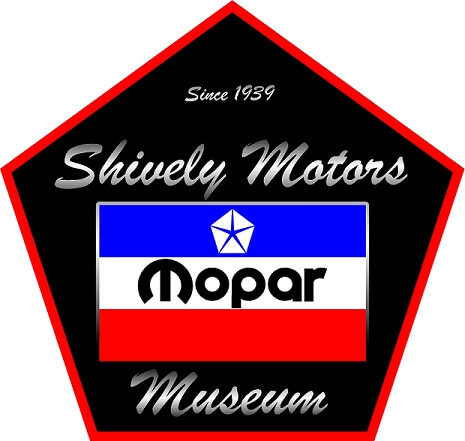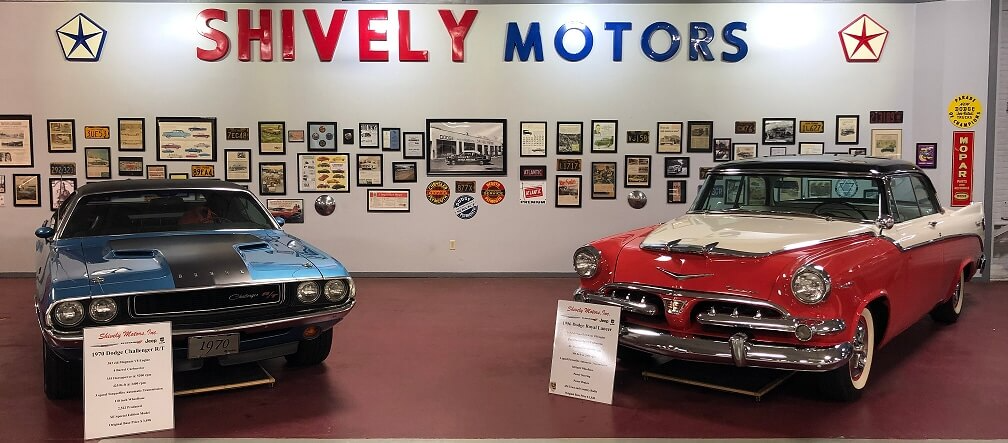Mopar Museum
Welcome to the Shively Motors Mopar Museum
We have 20 antique and classic vehicles on display. Many of these vehicles were sold new by Shively Motors or have local history. Browse many photos and memorabilia from over 80 years of Shively Motors history. The museum is free for customers and guests of Shively Motors to visit during normal business hours. The Mopar Museum is located at our Shippensburg dealership. Shively Motors is proud to share and display some of our long history here in Franklin County.
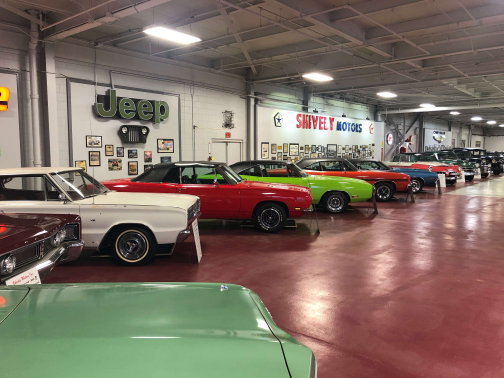
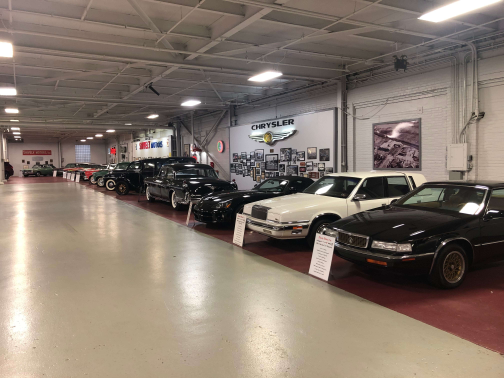
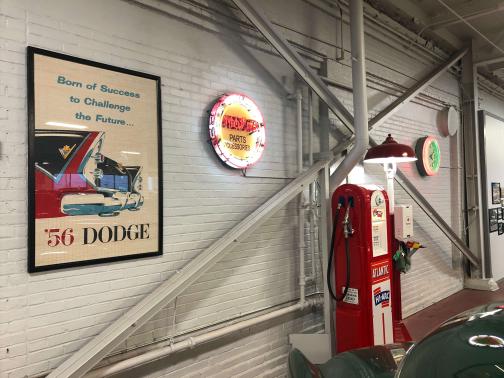
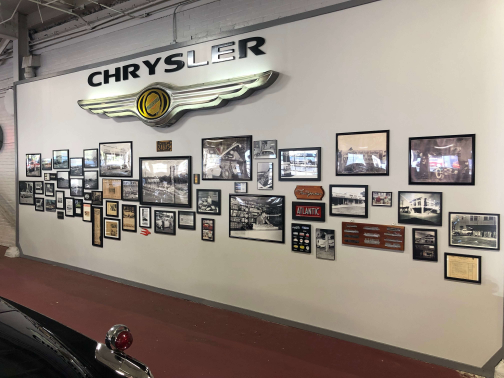
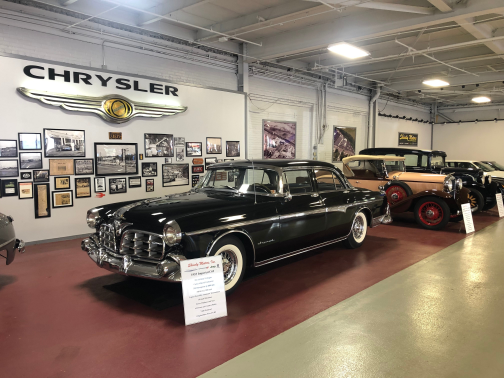
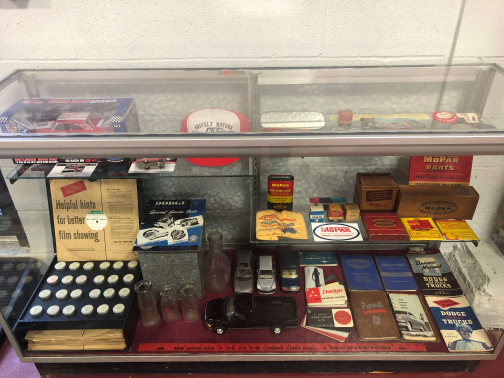
THE START OF A LEGACY
1930 Dodge Brothers DD-6
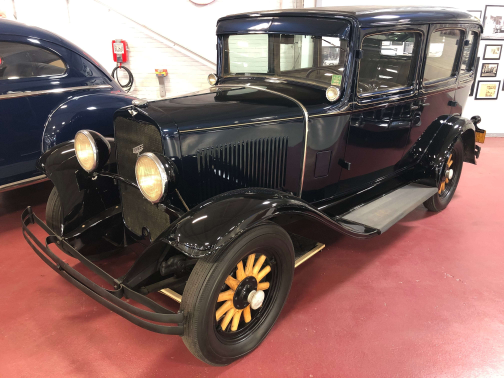
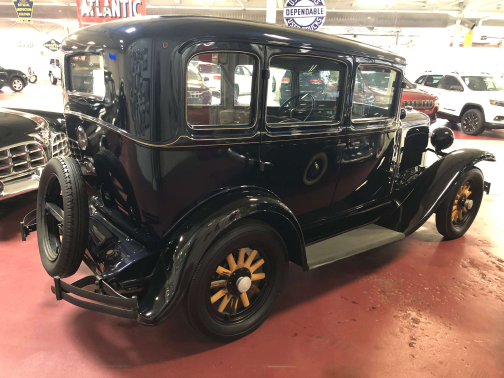
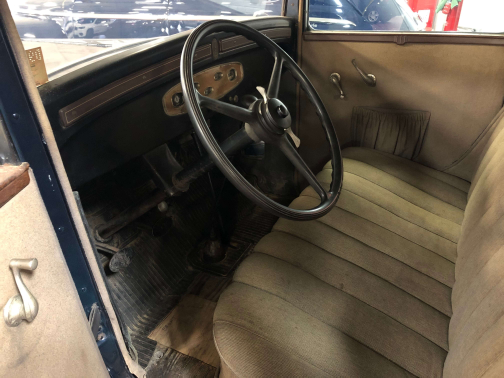
Walter P. Chrysler purchased the Dodge Brothers motor company in late 1928. Production was already in place for the 1929 model year. The 1930 Dodge Brothers was then the first Chrysler designed Dodge to be built. This was also the first year that Dodge introduced an 8-cylinder engine. In 1930, Dodge Brothers drove a new stock DD8 over 50,000 miles in 19 weeks to prove its dependability. The car was driven under every condition of road and weather. The Mileage Marathon was sanctioned and supervised by AAA and was the greatest dependability exhibition ever attempted at that time.
This particular 1930 Dodge Brothers DD6 sedan was built April 9, 1930 and shipped to Chambersburg, Pennsylvania. It was originally sold by Rippey T. Shearer in Chambersburg on June 15, 1930 to the Hoffman family. Paul and Edna Funk purchased the car from that family in 1965 for $300 and continued to own and drive the car until 2017 when purchased by Shively Motors.
The car has been repainted in the original colors; however, the interior is completely original including the original engine, wood wheels, and even back-up hand crank to start the car.
1931 (32) Dodge Brothers DH-6
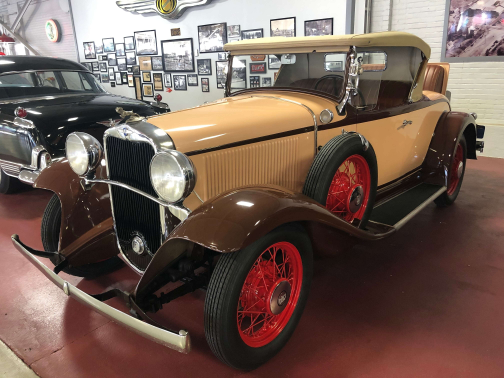
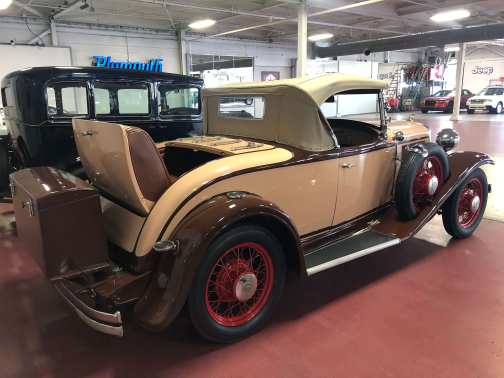
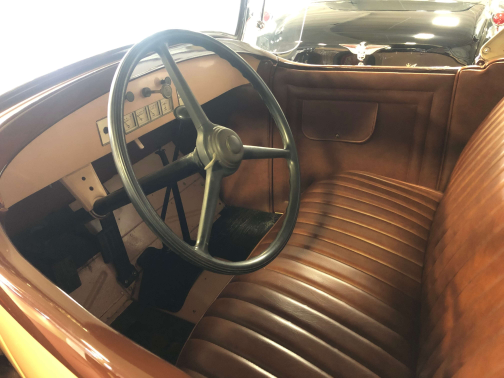
The depression years were hard for Dodge. Plymouth was the most profitable division for Chrysler during this period due to their lower prices. Dodge offered several different body styles in 1931 with the roadster body being the lowest production.
Since sales numbers where so low during 1931, beginning in July of 1931 Dodge started selling later production 1931 cars as "first series" 1932 models and titled the cars as 1932. The true 1932 DL model did not start production until November 1931. This car is one of those examples and is really a 1931 DH-6 titled as a 1932.
This car is one of only 160 DH-6 roadsters built in 1931. Only 4 are known to still exist in original condition. Of the 4, this is the latest production, built the first week of September 1931. Dodge discontinued the roadster body style with the DH making this car possibly the last known true roadster built by Dodge. This car was restored in 1980 and retains its original drivetrain. The car has optional dual side mount spares and a unique feature called Freewheeling. This feature allows the engine to turn at idle speed even in gear with the clutch engaged. It also allows shifting between forward gears without using the clutch.
Shively Motors acquired this car in Tennessee in 2021 and is proud to preserve this piece of Dodge history.
1941 Dodge WC ½ Ton Truck
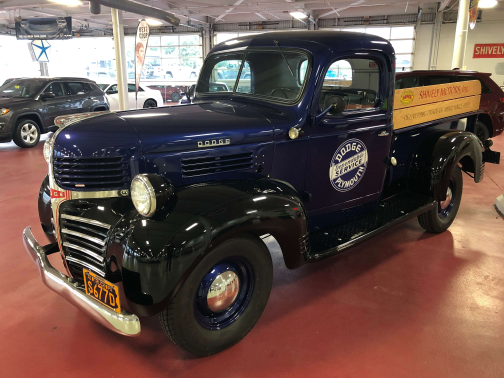
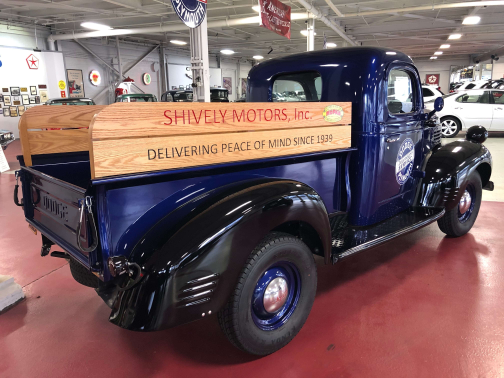
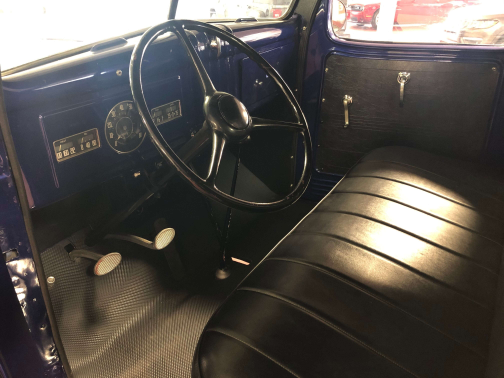
Dodge introduced a completely new line of Dodge Trucks in 1939 and became the first "Job-Rated" trucks by Dodge. Dodge then switched to building trucks for the military from 1942 to 1945. This body style lasted until 1947. These trucks are significant in the history of Dodge. They were the first trucks produced in the new Warren Truck Plant that still builds Ram trucks today. These "Job-Rated" trucks also created the basis for Dodge's first light duty military four-wheel drives during WWII and then later became the world's first factory 4WD commercial trucks, the Dodge Power Wagon. Dodge was also the first of the Big Three to offer a diesel-powered truck.
In 1941, Dodge was a leader in trucks offering 112 models, 18 wheelbases, and 6 engine options to suit every truck need. Though the 1939-47 Dodge trucks all look similar, the 1941 model is the only year with the horizontal chrome strips on the grill. This is an excellent example of the first Dodge trucks sold by Shively Motors. This truck is a frame off restoration retaining all its original sheet metal and engine. This truck was originally from a cherry orchard in Oregon. Shively Motors added the custom wood side boards to represent a vintage shop truck from Shively Motors and is the mascot vehicle for our dealership.
1948 Plymouth Special Deluxe
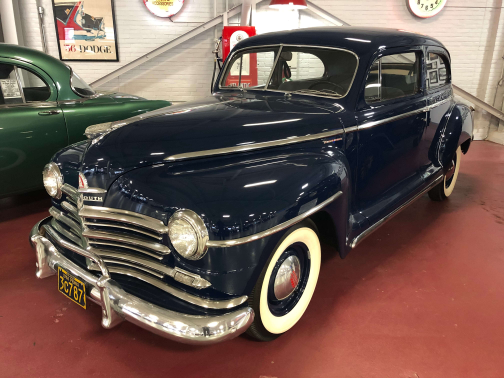
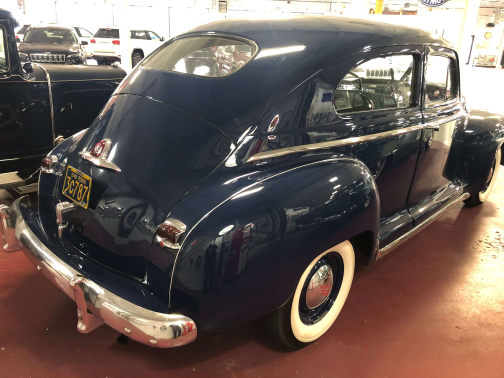
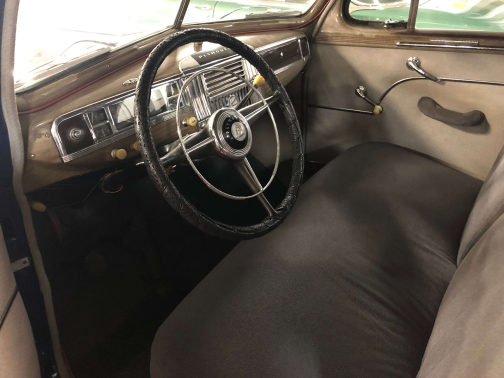
No new vehicles were produced in the United States during WWII from 1942 to 1945. Demand was high after the war and waiting lists became common as everybody wanted to purchase a new car. The 1946 to 1948 Plymouths are virtually identical since manufactures did not need to make any changes to the models because of the strong demand. That would soon change.
This 1948 Plymouth was such an example. Nevin Murray, a WWII veteran, was on a waiting list for over a year to purchase a new car. He took delivery of this 1948 Plymouth in September of 1948 from Barkdoll Motor Company in Chambersburg. Two months later he took this car on his honeymoon to Niagara Falls. Later he brought all seven of his children home from the Waynesboro Hospital in this car. He continued to drive this car daily for many years and it has over 200,000 original miles. After he passed away, the car remained garage kept as always until purchased by Shively Motors in 2014.
The car was repainted in the original color and the seats recovered by Mr. Murray in 1991. He had the car painted because he literally waxed the paint off the car from cleaning it after every drive. It has been garage kept since new.
1948 DeSoto Custom
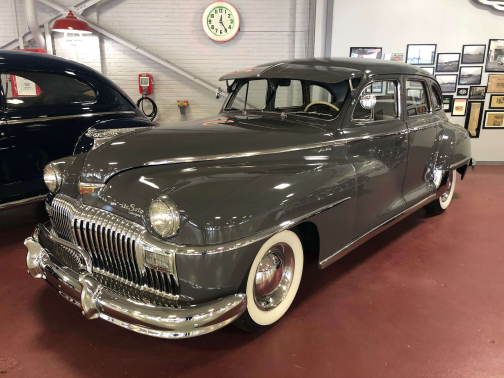
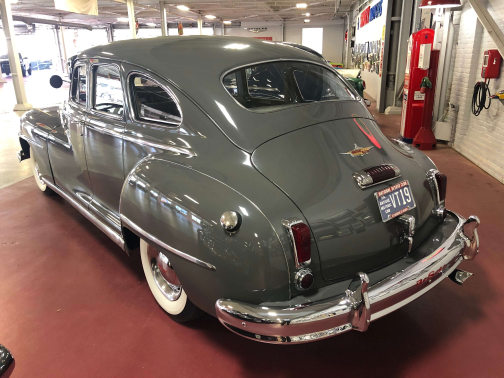
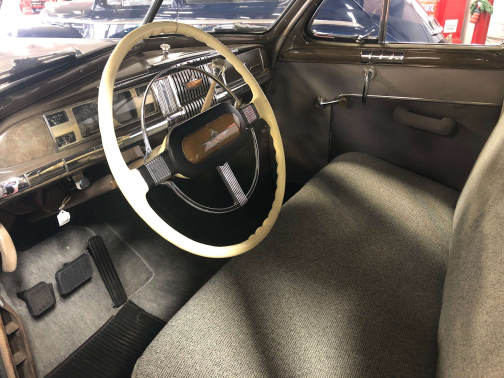
DeSoto, along with Plymouth, were formed by Chrysler in 1928 as new divisions of the Chrysler Corporation founded in 1925. Plymouth was the entry level make with DeSoto positioned as a mid-priced make below Chrysler. Soon after its introduction, however, the purchase of Dodge Brothers was completed giving Chrysler another mid-priced make. The two mid-priced strategy did work for many years. During WWII DeSoto plants were converted to building Sherman tanks for the war effort. Eventually, the markets changed and with an economic downturn in 1958 mid-priced cars suffered. Sales continued to fall and with the introduction of the lower priced Newport line from Chrysler, the decision was finally made in 1960 to discontinue the DeSoto make.
Like the other divisions of Chrysler, DeSoto models were essentially the same from 1946-1948. Demand for new cars after WWII was so strong that waiting lists were in place and people were happy just to be able to buy a new vehicle. New designs would come in 1949. Deluxe and Custom trim levels were offered in several body styles. This car is the higher Custom trim level with Fluid Drive. Shively Motors purchased this car locally in 2021. The previous owner had owned the car since 1997 and decided years ago that when the time came to sell the car, he wanted to see the car find a home in our Mopar Museum. Shively Motors is proud to present this DeSoto to our visitors.
1952 Willys M38
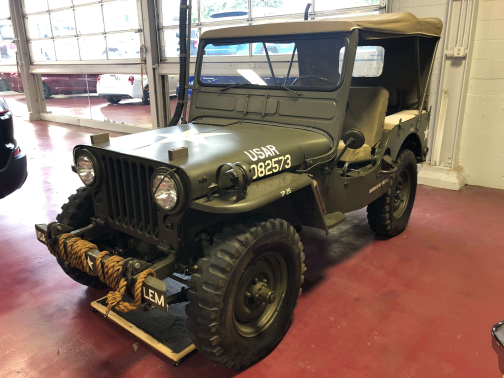
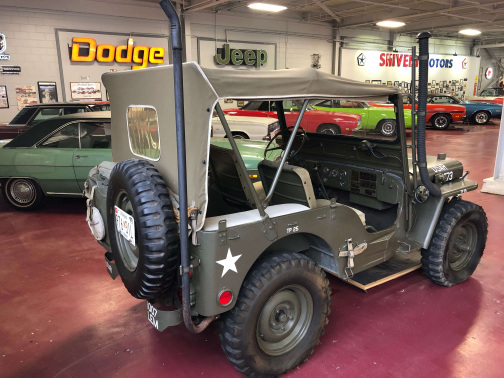

WWII was under way in Europe, so by 1940 the US Army needed a reconnaissance car to move troops in preparation of the United States entering the war. The Army submitted the requirements to 135 US auto manufacturers. Initially, only American Bantam and Willys-Overland entered vehicles, however, Ford entered later. Bantam won the original contract, but due to not having the production capacity and financial resources to meet the needs of the War Department, Willys and Ford started to build models for the Army. By 1941 they decided to standardize the vehicle and Willys ultimately won the government contract. Ford produced them as well during the war, but only according to Willys specifications. The name "Jeep" was in use even before the war and no consensus has ever been reached as to how the name originated. The M38 was the "Jeep" made by Willys from 1949 to 1952 and was the military version of the then current CJ-3A built for civilian use.
This particular 1952 Willys M38 was built for military use during the Korean War. This Jeep is also equipped with a snorkel and modified exhaust to enable it to drive through water. Currently this Jeep is on loan to Shively Motors and is a classic example of the Jeep that had served the United States Military for decades.
1954 Dodge Meadowbrook
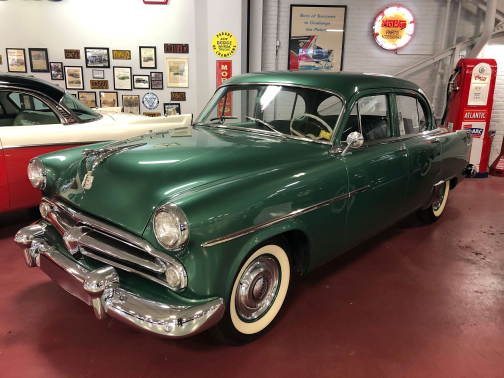
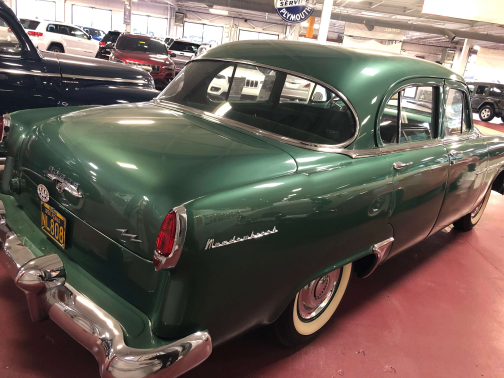
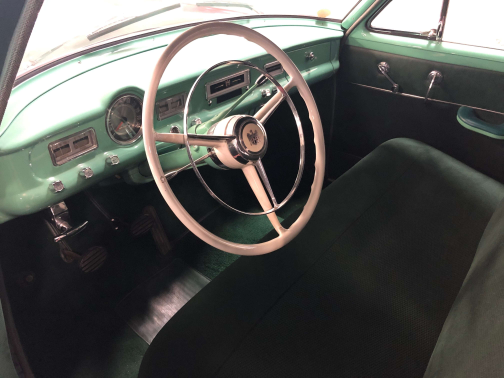
American cars are now beginning to change from the styles of the 1940s. The 1953 Dodge saw its first "Hemi" engine that year and was called the "Red Ram" V8. This was the grandfather of the muscle car. Shively Motors sponsored a local driver, Charles Greene, and raced a 1953 Dodge V8 up and down the East coast. The 1954 Dodge was very similar to the 1953 model. 1955 would bring radical changes.
This 1954 Dodge Meadowbrook was purchased new at Shively Motors July 22, 1954 by Bernice Steiger. Henry Carbaugh purchased the car in 1981 from the Steiger family for $550. In 2004 he had the car completely restored as original. The car has just over 51,000 documented miles. The Meadowbrook was the base model for Dodge that year. This car has the proven inline 6-cylinder engine instead of the optional "Red Ram" V8. Shively Motors purchased the car from the Carbaughs in 2015.
1955 Imperial C69
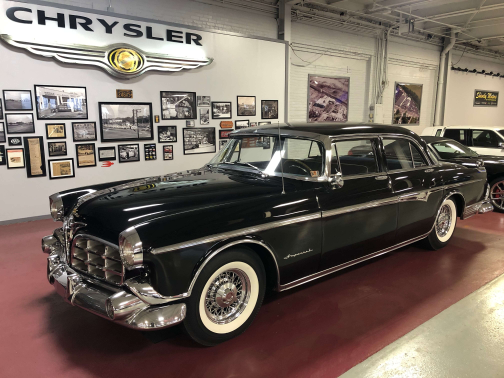
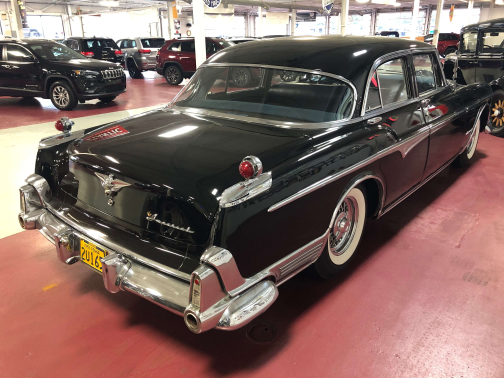
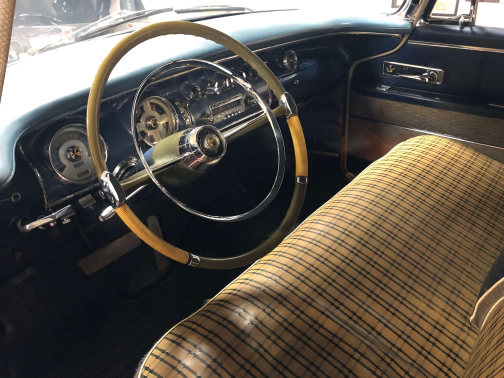
1955 was a turning point in automotive design. Auto manufacturing suffered some downturn during the early 1950s due to the Korean War. During that time, however, designers were busy coming up with exciting new vehicles. In the late summer of 1954, Chrysler was advertising the "100 Million Dollar Look" campaign. This was a very large sum of money at the time. Chrysler had hired Virgil Exner to lead the design team and gave him a blank check to redesign their entire product line. The investment paid off and Chrysler became a leader in product design for years following. 1955 also saw the introduction of the legendary Chrysler 300. Powered by a 331 Hemi V8 engine producing 300 Horsepower, the new Chrysler 300 dominated NASCAR. Chrysler had more NASCAR wins in 1955 and 1956 then all other nameplates combined.
Chrysler decided to make Imperial a stand-alone brand in 1955 to set it apart as a luxury automobile to compete with Cadillac. The Imperial uses the same 331 Hemi V8 from the Chrysler 300 also sharing the distinctive egg crate grill. The 1955 Imperial represented "The finest car America has yet produced" according to Chrysler's ads at the time.
Shively Motors purchased this Imperial in 2019 from a former long time Chrysler dealer who had purchased the car from a customer in the 1980s. The car is all original and Shively Motors is proud to preserve this rare and historic automobile.
1956 Dodge Royal Lancer
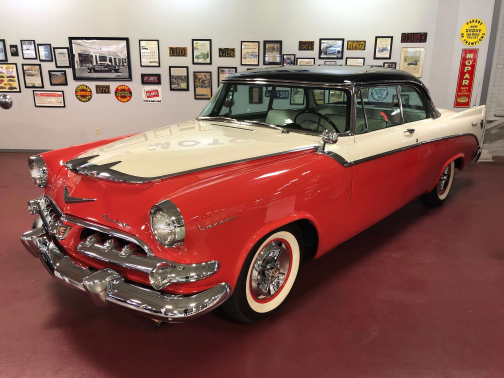
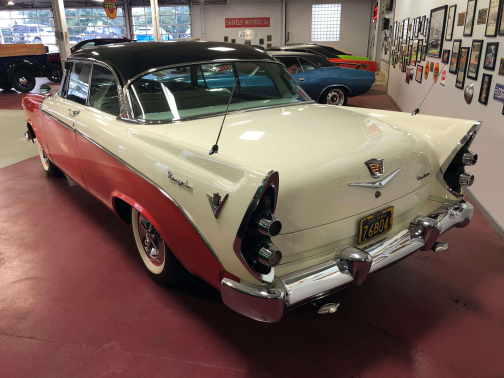
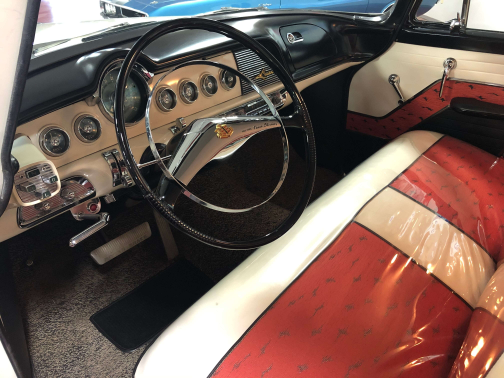
The 1955 model year brought major changes to the entire Chrysler product line. Virgil Exner was the head designer and created the "Forward Look." 1956 brought more enhancements including the first push button automatic transmission and 12-volt electrical systems. Tail fins, more chrome, and tri-tone paint jobs created a much different appearance than just one or two years prior. Style and features became the hallmarks for the remainder of the 1950s.
This 1956 Dodge Royal Lancer has no direct connection with Shively Motors, however, we have several pictures and artifacts that relate to the 1956 Dodge. One picture we have is of Shively Motors taken in 1956 with a full lot of new cars taken in color. We told a friend in Hershey, PA that if he ever came across a nice 1956 Dodge we would be interested. About 6 months later we received a call that he indeed found one. This is the car and the condition that it was found. This car was properly restored as original with the original interior and options such as Power Steering, Power Brakes, and original Town and Country AM radio that still works. Shively Motors purchased the car in 2015.
1966 Dodge Charger
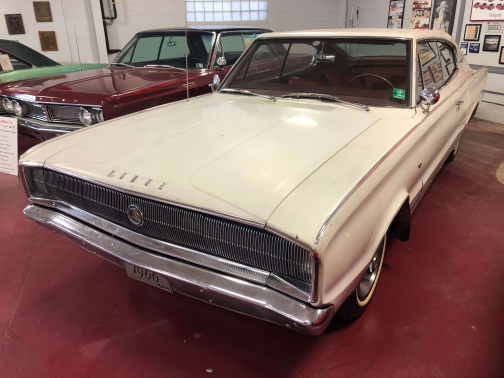
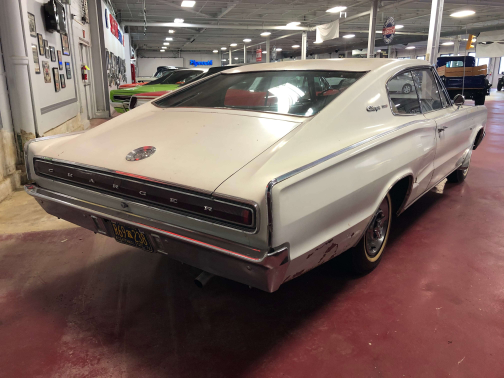

The 1966 Dodge Charger was a new model that year. Automakers were looking for something different in car design. The new "fastback" look was starting to enter the market. The Charger was based on the Dodge Coronet but with a new fastback design, fold away headlights, and four bucket seats that folded flat in the back to create large cargo space if needed. This body style, however, only lasted until 1967 when the more traditional 1968 B-body cars debuted.
The 1966 Dodge Charger was introduced on January 1, 1966 during the Rose Bowl as the "Leader of the Dodge Rebellion." This particular Charger was purchased at Shively Motors on January 22, 1966 by James Eger. He and his wife traded their two used cars on this all new Charger. They drove the car for ten years putting over 89,000 documented miles on the car. When the time came to purchase another car, they decided to keep the Charger in the garage. The car then sat for the next 40 years. The inspection sticker is still on the car that expired in 1977. Fortunately, the car spent most of the years in a garage and was still in decent shape. Their son told us that he had his parent's 1966 Charger during a conversation when he was purchasing a much newer Dodge Charger at the dealership. After hearing about the car, we inquired about purchasing it. We then rebuilt the 318 V8, replaced the brakes, tires, fuel tank, and serviced the car. After 40 years, the Charger is back on the road. Everything is still original including paint, interior, even the hubcaps. A true "barn find."
1967 Chrysler Newport Custom
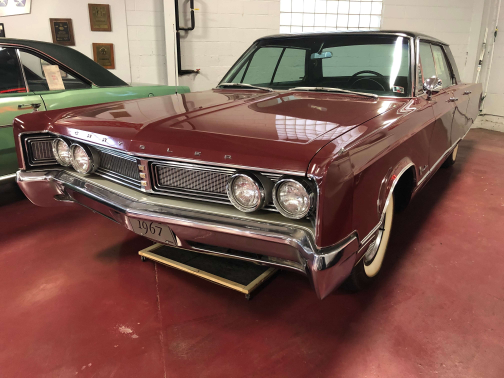
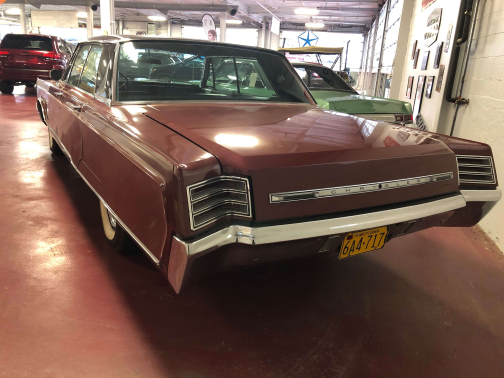
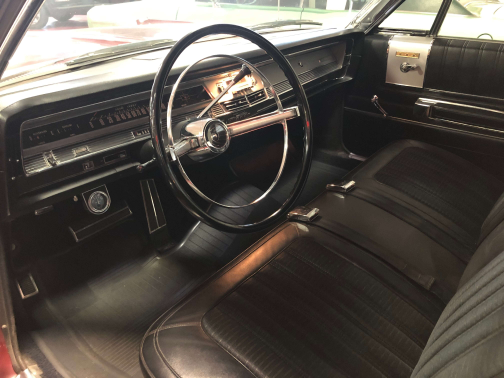
The Chrysler Newport was the mainstream model for Chrysler and came in various body styles from convertible to station wagon. The 1967 model year was in the fourth generation of the Newport and the first year offering a more luxurious Newport Custom series.
This 1967 Chrysler Newport Custom was purchased new at Coldbrook Motors December 13, 1966 by Raymond Armstrong. This car remained with the Armstrongs until 2014 when it was sold at an estate sale. The car then ended up at the Carlisle, PA show and was then sold to Mervin Buckwalter in Lancaster, PA. When he discovered the connection with Shively Motors, he mailed us a letter with pictures asking if we were interested in the car. We drove to Lancaster and purchased the car in 2015. This car is all original including the original window sticker, manuals, and even receipt from the dealership when purchased new.
1969 Plymouth Barracuda
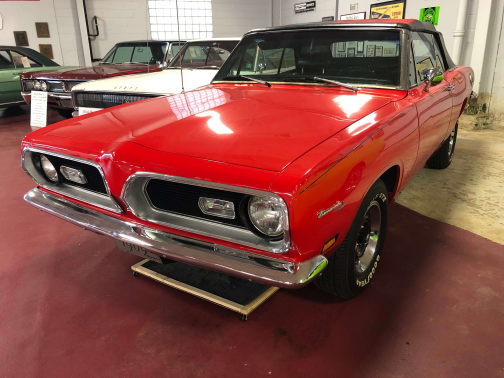
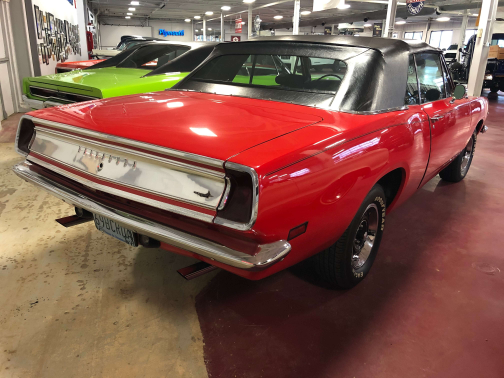
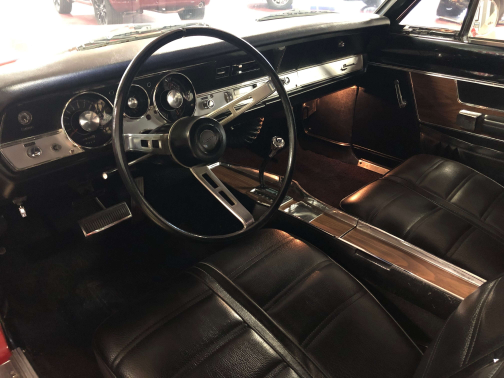
The Plymouth Barracuda was introduced in 1964 as Chrysler's answer to the new pony car segment. Ford was about to unveil the Mustang and Chrysler needed a new model to compete. The Barracuda was based on the Valiant and shared many of its parts but with a new fastback body style. The "pony car" segment was born. These were modestly equipped compact sedans and convertibles with standard 6-cylinder engines but could be customized with V8 power and extra options. 1967 bought the introduction of a convertible model. Most were built as fastbacks.
This 1969 Plymouth Barracuda convertible was actually taken in trade on a new vehicle purchase at Shively Motors in 2016. An older couple owned this car and had restored and enjoyed driving the car for over 30 years. They reached a point in life that they could no longer care for the car and had different transportation needs. Shively Motors is pleased to keep this Barracuda on the road.
1970 Dodge Challenger R/T SE
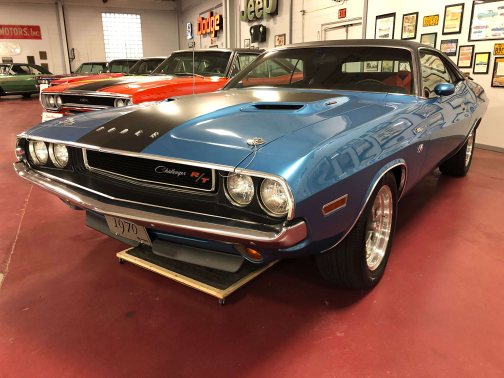
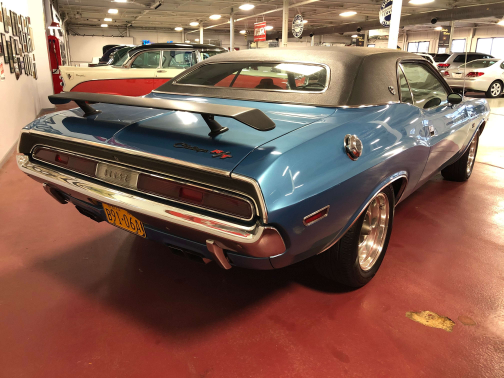
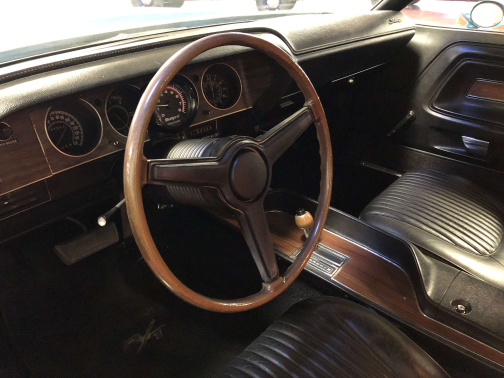
In 1964 John Z. Delorean created the GTO by putting V8 power and performance in a Tempest. This created a new market for the muscle car. That same year the Mustang debuted as well as the Plymouth Barracuda. By 1967 the Camaro and Firebird were also in the market. Dodge had already been successful with the Charger and even greater extent with the Plymouth Road Runner by 1968. Dodge believed however, a smaller, more agile model was needed to compete with the Mustang and Camaro. Thus, the 1970 Dodge Challenger was born. The Challenger was available in many trims and engine sizes from the base slant six all the way to the legendary 426 Hemi. Many colors and options were available to make your Challenger unique.
This Challenger R/T SE is an excellent example of the first year of production. Finished in B5 blue metallic paint and powered by a 383 Magnum V8, it is one of only 2,522 R/T Special Editions produced in 1970. The SE package includes a unique formal rear window, leather seats, velour headliner with overhead console, and more. The 1970 Dodge Challenger became the design inspiration of the new Dodge Challenger introduced in 2008 and continues today.
1970 Dodge Charger 500
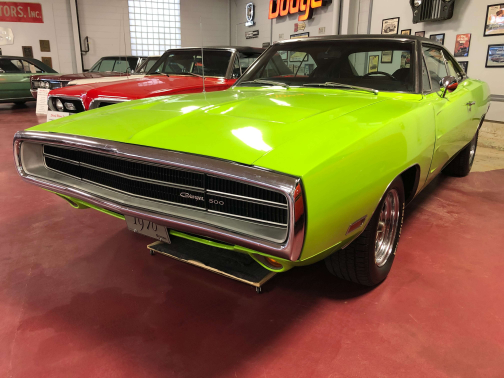

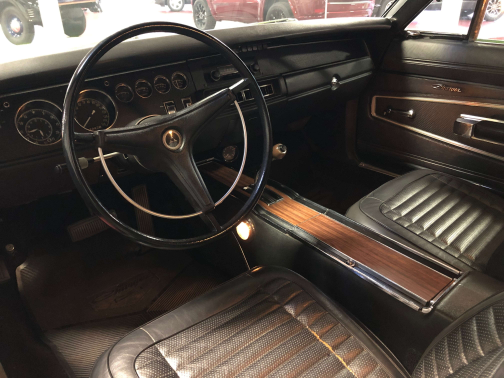
The 1968-70 Dodge Charger is one of the most iconic cars of the muscle car era. The new design was an instant hit. 35,000 cars where planned for production, however, over 96,000 Chargers were built that first year. This B-body model was made popular in many films and TV shows including the famous chase scene in the 1968 movie "Bullitt" and the popular 1980's TV series "The Dukes of Hazzard". The 1970 model year brought minor changes including a large wraparound chrome bumper and the grill was no longer divided in the middle. Electric headlight doors replaced the vacuum operated ones. New "High Impact" colors were offered giving the Charger a bold look. Engine choices ranged from the basic slant-six to the legendary 426 Hemi V8. Model choices that year included the base Charger, 500, and R/T. By 1970, however, production dropped to less than half of the 1968 level. This was due to both the introduction of the new E-body Dodge Challenger and rapidly increasing insurance rates. In the 1970 NASCAR season, the 1970 Charger had 10 wins, more than any other car. Buddy Baker, driving a Daytona, was the first and only legal car to run over 200 mph in 1970, a record that stood for 13 years.
This 1970 Dodge Charger 500 is a very original example of the classic B-body design. This car has only one repaint in the original High Impact "Sublime" green. This Charger had only 2 previous owners since acquired by Shively Motors in 2018. The Charger was originally sold by Music City Dodge in Nashville, TN. Included with the car is the original window sticker, build sheet, bill of sale and other records. The interior and vinyl top are still original as well as the numbers matching 383 4bbl V8 engine.
1970 Plymouth GTX
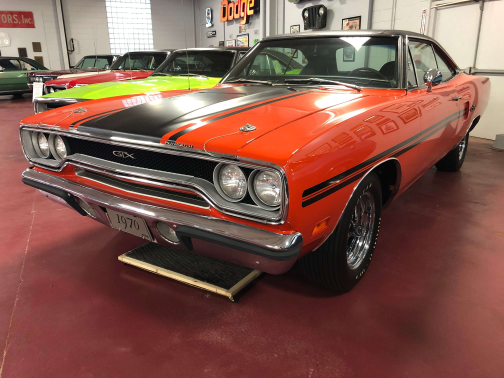
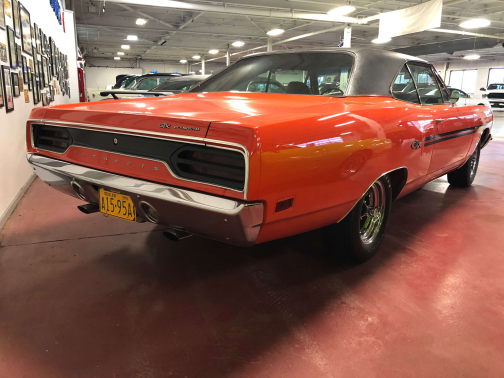
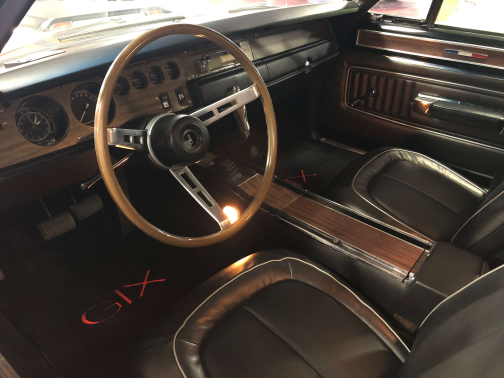
The 1970 Plymouth GTX was the positioned as the upscale model of the popular Road Runner. The GTX included more options and added luxury as well as performance to the car. The 1968-70 B-body Dodge and Plymouth models are some of the most desirable cars from the muscle car era. 1969 and 1970 also brought the limited edition high performance models Dodge Charger Daytona and Plymouth Superbird. With an oversized wing on the rear and large aerodynamic nose, they did not sell well on the showroom floor. They did, however, produce important wins in NASCAR for Chrysler. Today these cars can demand very high values.
This particular GTX was completely restored by a former mechanic of Shively Motors. He spent over seven years working on the car to bring it back to original. Shively Motors purchased the car from him in 2015 when he decided to move out of the area. This car has all the desirable options including the Hurst "Pistol Grip" 4 speed transmission, Air Grabber hood scoop, bucket seats with full console, and even original AM/8 Track radio. Details include new Goodyear Polyglas GT tires and original 1970 PA Dealer tag just as it would be ready for a test drive at the dealership in 1970.
1974 Dodge Dart Swinger
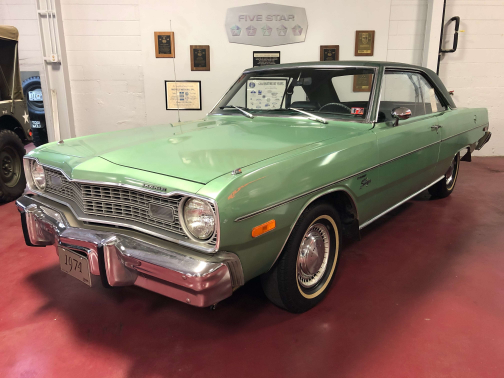
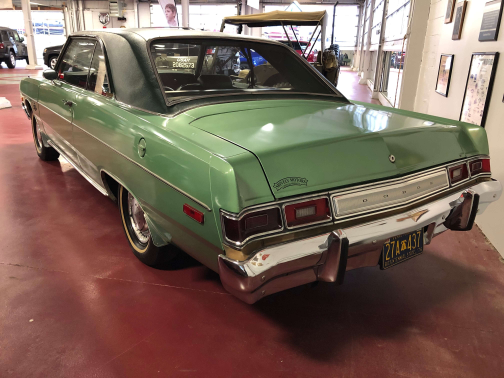

First introduced in 1967, the Dodge Dart was a mainstream mid-size car that could be purchased with the slant six engine or V8 power. Changes were made over the years, but production ultimately ended in 1976. By 1974 the Dodge Dart was basically the same as the Plymouth Valiant. The Plymouth proved far more popular, however due to its lower price for basically the same car.
This Dart was purchased new at Shively Motors November 27, 1973 by Harold Burkholder. This was his first new car and he was proud to own it. After he passed away, his wife continued to drive the car regularly until she was no longer able to drive. She had contacted our dealership about selling the car and we purchased it from her on November 27, 2019 exactly 46 years to the day they originally purchased the Dart. The car is a true survivor with original paint, vinyl top, and interior. All the original paperwork is still with the car including the window sticker, bill of sale, and warranty papers. Shively Motors is honored to preserve this car and display a part of our dealership's history as well.
1988 Jeep Grand Wagoneer
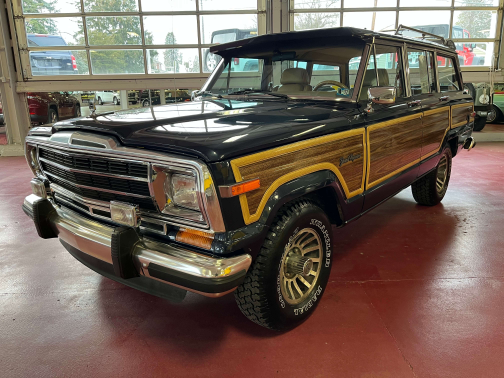
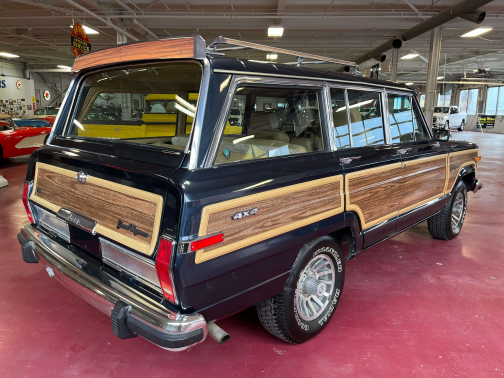
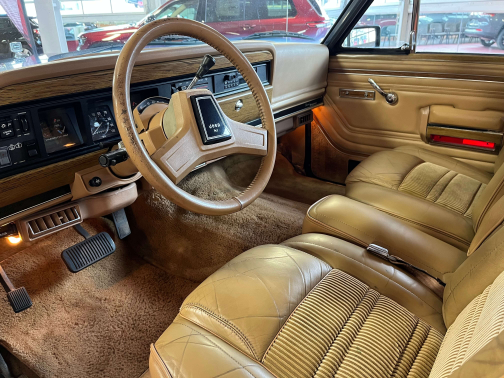
The Jeep Wagoneer was a full-size SUV that was produced from 1963 to 1991. It originally was designed during the ownership of the Kaiser Jeep Corporation. Kaiser Jeep was later acquired by AMC in 1970. Production continued with minor changes along the way. In 1987 Chrysler purchased Jeep from AMC and became a new division of the Chrysler Corporation. Chrysler continued to build the Grand Wagoneer and made many improvements to the profitable vehicle through 1991. Chrysler still used the carbureted AMC V8 engine through 1991 making it the last mass-produced vehicle to still use a carburetor over fuel injection. Due to increased fuel prices and antiquated design that could not meet new Federal safety standards, the decision was made to discontinue the Grand Wagoneer. The Jeep had a great run as the longest running domestically built vehicle on the same platform.
Jeep has brought the Wagoneer and Grand Wagoneer back in 2022 as a true full-size SUV with 7 passenger seating and luxury to rival any brand. This particular Grand Wagoneer was purchased new December 5, 1987 at McKnight Motors in Chambersburg, PA. The Jeep was traded and sold again on April 24, 1990 at Shively Motors in Chambersburg, PA. Shively Motors was then able to purchase the Jeep from the second owners who enjoyed the Jeep for over 31 years in 2021. Included with the Jeep was all the original bills of sale, books, and original window sticker. Shively Motors is proud to display this piece of Jeep history.
1990 Chrysler New Yorker Fifth Avenue
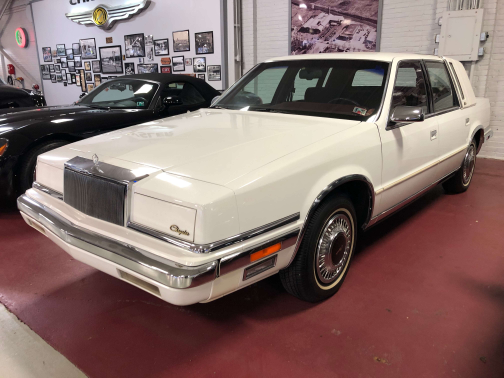
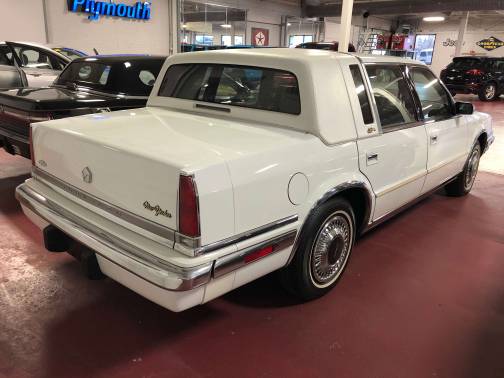
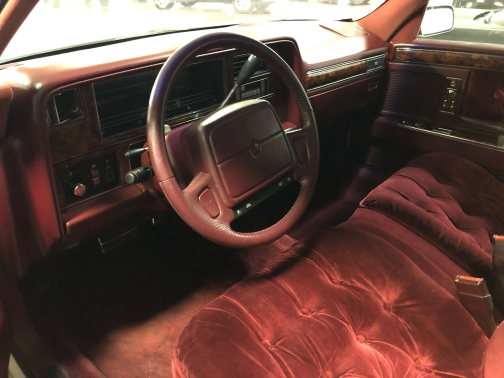
The Chrysler New Yorker had been a model used by Chrysler from 1940 to 1996 serving as the brand's flagship for decades. The Fifth Avenue was a trim level or model name used from 1979 to 1993. 1990 was the introduction of the final Fifth Avenue models. This Fifth Avenue was built on a longer wheelbase than the standard New Yorker making it a full-size car once again. 1990 also introduced the return of hidden headlamps. The Fifth Avenue models were covered by Chrysler's market-leading "Crystal Key Owner Care Program" that included a 5-year/50,000-mile limited warranty and 7-year/70,000-mile powertrain warranty. 1993 would be the end of the Fifth Avenue as the all new "Cab Forward" LH cars would take their place.
This 1990 Chrysler New Yorker Fifth Avenue was taken in trade on a used vehicle at Shively Motors in 2015. The car has less than 65,000 original miles and was originally sold by Shively Motors in 1990. The condition of the car is all original as traded. Shively Motors celebrated our 50th anniversary in 1989. That year one of our customers purchased their 53rd car from Shively Motors. Displayed in our showroom is the newspaper article with pictures. That car was a white 1990 Chrysler New Yorker Fifth Avenue identical to this car.
1991 Chrysler TC by Maserati
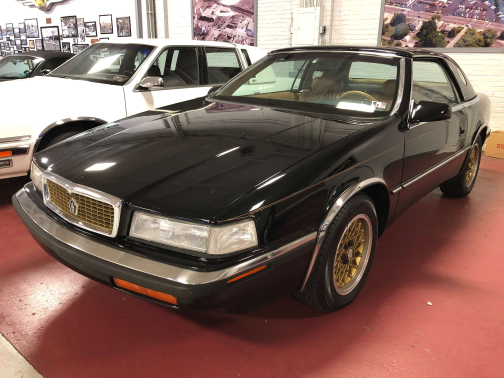
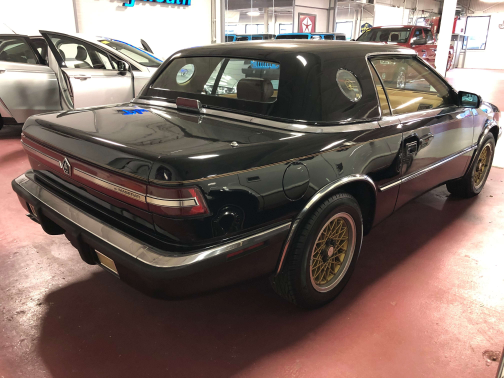
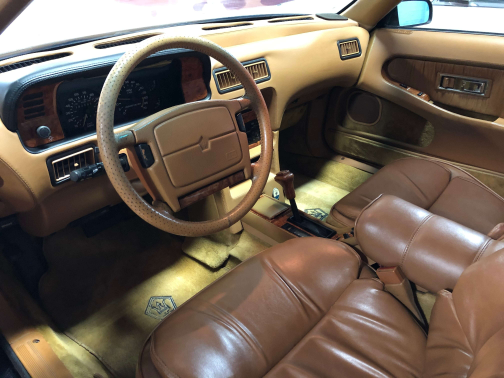
The Chrysler TC was intended by Lee Iacocca to be an image building car for the Chrysler brand. The TC was built in Milan, Italy by Maserati using a modified Dodge Daytona chassis and body styling that resembled the Chrysler Lebaron convertible. Due to years of delay from mismanagement and issues between the Chrysler and Maserati engineers, the TC was late to market and was introduced after the new Chrysler Lebaron convertible hit the market. The TC was expensive and not distinctive enough from the Lebaron that could be purchased for about half the price and had more color options as well. Only 7,300 TC cars where built during the model years of 1989-91. The TC featured a removable hard top with porthole windows as well as a power soft top concealed behind a hard boot. The seats, including the dash, where wrapped in Italian leather.
The Chrysler TC is an interesting footnote in Chrysler's history. The K car helped save Chrysler in the 1980's but the TC became a costly mistake for Chrysler costing the company $600 million or over $80,000 each in 1990 dollars. Later Chrysler and Maserati would share corporate ownership when Fiat acquired Maserati in 1993 and then Fiat merged with Chrysler in 2009.
2004 Dodge Viper SRT10
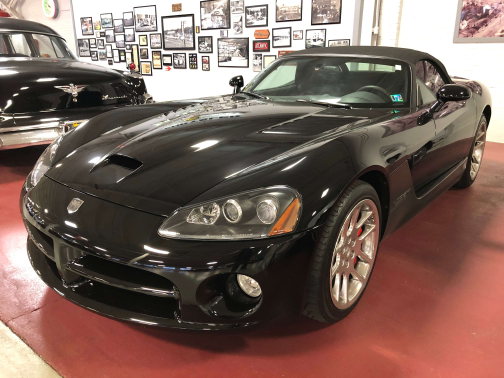
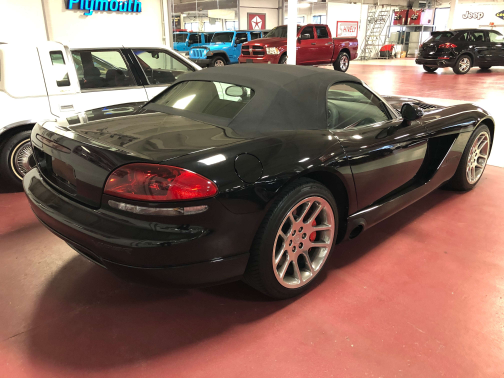
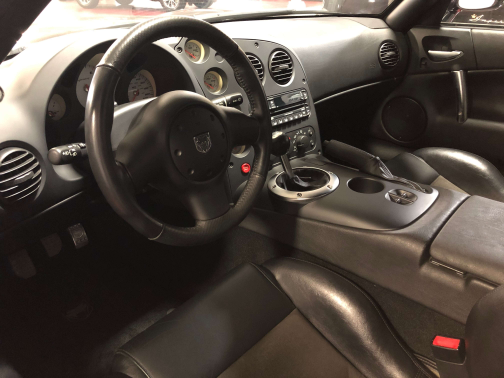
The Dodge Viper debuted in 1991 as the pace car for the Indianapolis 500. The car went on sale in January of 1992 as the RT/10 Roadster. Lamborghini, then owned by Chrysler, helped develop the aluminum casting for the new V10 engine. The original Viper was a raw performance car with little creature comforts. It had no exterior door handles, no air conditioning, and no real side windows. The roof was canvas and the side windows were vinyl and zipped into place. The Viper continued for 5 generations of changes with a brief hiatus from 2010 to 2013. Due to increasing safety regulations and low sales numbers, FCA finally made the decision to discontinue the Viper in 2017.
The 2004 Dodge Viper is the third generation of Viper. This generation has more comforts than the original such as power windows, AC, and real functioning convertible top. These Vipers, however, have no electronic systems to help correct the driver such as traction control, and is pure horsepower to the rear wheels. This 2004 Dodge Viper was originally sold new at Naugle Motors in Shippensburg, PA. Naugle Motors was the dealership that Shively Motors purchased in 2008 and is now Shively Motors of Shippensburg. This Viper was the personal car of Bill Naugle, one of the previous owners. In 2011 Bill Naugle decided to sell the Viper and was then purchased by Shively Motors.

